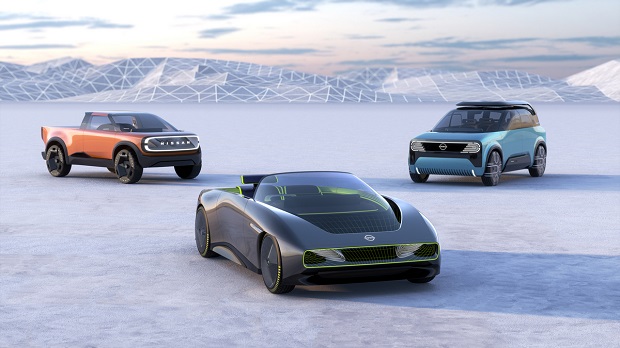Japanese carmaker Nissan Motor Co., Ltd. unveiled on Monday, Nov. 29, its new long-term vision called Nissan Ambition 2030, which aims to build a smart ecosystem with integrated mobility.
Over the next ten years, Nissan said it will deliver electrified vehicles and technological innovations while expanding its operations globally. The vision supports Nissan’s goal to be carbon neutral across the life cycle of its products by fiscal year 2050.
Nissan CEO Makoto Uchida stated: “The role of companies to address societal needs is increasingly heightened. With Nissan Ambition 2030, we will drive the new age of electrification, advance technologies to reduce carbon footprint and pursue new business opportunities. We want to transform Nissan to become a sustainable company that is truly needed by customers and society.”
As a pioneer of electric vehicles (EVs), Nissan has democratized EVs and invested in building charging infrastructure and energy management. By placing electrification at the core of the company’s long-term strategy, Nissan Ambition 2030, the company aims to accelerate the electrification of its vehicle lineup and rate of technology innovation with investments of 2 trillion yen over the next five years.
Based on customer demands for a diverse range of exciting vehicles, Nissan will introduce 23 new electrified models, including 15 new EVs by fiscal year 2030 aiming for an electrification mix of more than 50% globally across the Nissan and INFINITI brands.
With the introduction of 20 new EV and e-POWER equipped models in the next five years, Nissan intends to increase its electrification sales mix across major markets by fiscal year 2026, including:
- Europe by more than 75% of sales
- Japan by more than 55% of sales
- China by more than 40% of sales
- The United States by 40% of EV sales in fiscal year 2030
“We are proud of our long track record of innovation, and of our role in delivering the EV revolution. With our new ambition, we continue to take the lead in accelerating the natural shift to EVs by creating customer pull through an attractive proposition by driving excitement, enabling adoption and creating a cleaner world,” said Nissan COO Ashwani Gupta.
Representing the next stage of Nissan’s electrified future, the company also unveiled three new concept cars that offer enhanced experiences through sophisticated technology packaging.
Nissan said it will continue to evolve its lithium-ion battery technologies and introduce cobalt-free technology to bring down the cost by 65% by fiscal year 2028.

Nissan aims to launch EV with its proprietary all-solid-state batteries (ASSB) by fiscal year 2028 and ready a pilot plant in Yokohama as early as fiscal year 2024.
With the introduction of breakthrough ASSB, Nissan will be able to expand its EV offerings across segments and offer more dynamic performance. By reducing charging time to one-third, ASSBs will make EVs more efficient and accessible.
Further, Nissan expects ASSB to bring the cost of battery packs down to $75 per kWh by fiscal year 2028 and aims to bring it further down to $65 per kWh to achieve cost parity between EV and gasoline vehicles in the future.
Nissan seeks to establish a global battery supply system to meet growing customer vehicle demand and support the growing number of EVs in use. Working with its partners, Nissan intends to increase its global battery production capacity to 52 GWh by fiscal year 2026, and 130 GWh by fiscal year 2030.
Though Nissan Ambition 2030, the company also seeks to extend the benefits of mobility by delivering its advanced driver-assistance and intelligence technologies to more customers.
Nissan aims to expand ProPILOT technology to over 2.5 million Nissan and INFINITI vehicles by fiscal year 2026. The company will also further develop its autonomous vehicle technologies, aiming to incorporate next generation LIDAR systems on virtually every new model by fiscal year 2030.
In addition to technology upgrade, Nissan will localize manufacturing and sourcing to make EVs more competitive. Nissan will expand its unique EV Hub concept, EV36Zero, which was launched in the UK to core markets including Japan, China and the US.
EV36Zero is a fully integrated manufacturing and service ecosystem connecting mobility and energy management with the aim of realizing carbon neutrality.
The company intends to expand its battery refurbishing facilities beyond Japan with new locations in Europe during fiscal year 2022, and in the US in fiscal year 2025.
Nissan’s refurbishing infrastructure will support a circular economy in energy management, and the company aims to fully commercialize its vehicle-to-everything and home battery systems in the mid-2020s. In addition, the company will invest up to 20 billion yen by 2026 towards charging infrastructure.




